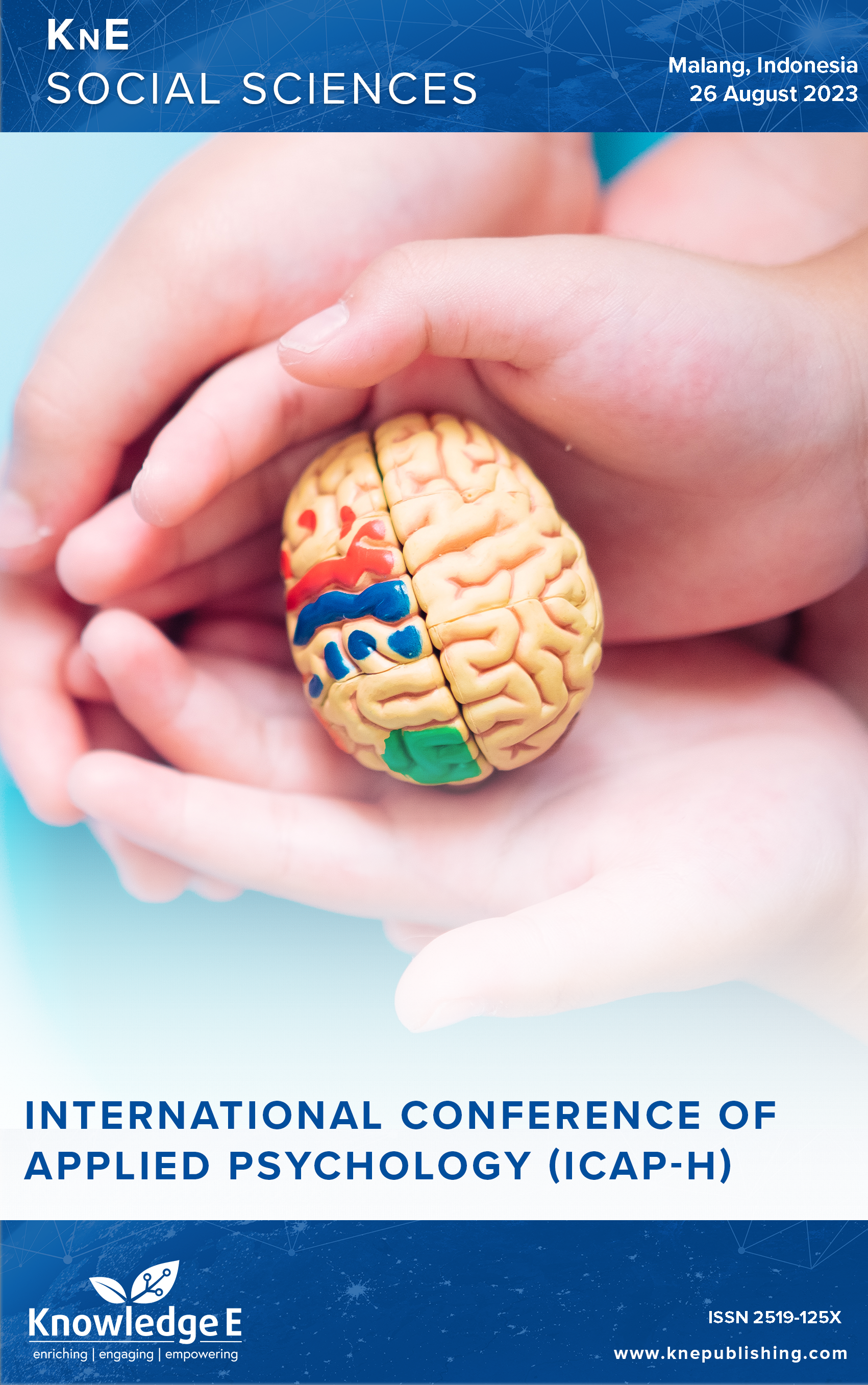Moral Intelligence and Bullying At Junior High School
DOI:
https://doi.org/10.18502/kss.v9i5.15193Abstract
There are many cases of bullying at junior high school level. Every school are now inclusive school because of the diverse culture, socioeconomic status, and students with various special needs. The diversity makes students look different. This is actually an opportunity for students to hone tolerance, or as opposite a high risk for occurrence of bullying. Therefore bullying is related to moral intelligence. If students can show empathy, they tend to think wisely and act positive. Coversely, those who bully others are students who lack kindness and act to suppres their peers. The purpose of this study was to determine the relationship between moral intelligence and bullying in junior high school students. The method used is quantitative with a correlational design. The subject were 300 junior high school students, boys and girls. The research used Moral Competency Inventory (MCI) scale and Olweus Bully/Victim Questionnaire (OBVQ) scale to collect the data, and data were analyzed using person product moment correlation. The results show negative and significant relationship between moral intelligence and bullying behavior in junior high school students with a correlation value of –0.633 and a significant value of 0.001.
Keywords: moral intelligence, bullying, junior high school student
References
Fania Putri Z, Wahyudi A, Muyana S, Prasetiawan H, Amirudin M, Wahyudi A, et al. Pengembangan media permainan monopoli topeng cirebon dalam bimbingan kelompok tentang kontrol diri. Jcose J Bimbing Dan Konseling. 2022;4(2):35–46. DOI: https://doi.org/10.24905/jcose.v4i2.93
Ratih IA, Widiasavitri P. Hubungan antara dukungan sosial dengan penyesuaian diri pada remaja awal di panti asuhan kota denpasar. J Psikol Udayana. 2016;3(3):542– 550.
Arini DP. Emerging adulthood: Pengembangan teori erikson mengenai teori psikososial pada abad 21. J Ilm Psyche. 2021;15(01):11–20. DOI: https://doi.org/10.33557/jpsyche.v15i01.1377
Barida M, Prasetiawan H. Urgensi pengembangan model konseling kelompok teknik self management untuk meningkatkan kecerdasan moral siswa smp. J. Fokus Konseling. 2018;4(1):27. DOI: https://doi.org/10.26638/jfk.439.2099
Salleh NM, Zainal K. Bullying among secondary school students in Malaysia: A case study. International Education Studies. 2014;7(13):184–119. DOI: https://doi.org/10.5539/ies.v7n13p184
Erismon E, Karneli Y. Efektivitas Pendekatan rational emotive behavior therapy untuk mengatasi perilaku bullying siswa. J Educ J Pendidik Indones. 2021;7(1):1. DOI: https://doi.org/10.29210/120212694
Ballerina T, Saloka Immanuel A. Menelisik perilaku perundungan pada siswa smp di Yogyakarta [Online]. J Ilmu Perilaku. 2019;3(1):18–31. DOI: https://doi.org/10.25077/jip.3.1.18-31.2019
Ishari SA. Cartiya, Pengaruh Bullying Terhadap Moralitas Ssiswa Di Smp Negeri 1 Naringgul Desa Naringgul Kecamatan Naringgul Kabupaten Cianjur. Jurnal Geografi. 2019;2(2):66–78. Available from: https://ejournal.unibba.ac.id/index.php/geoarea/article/view/895
Af’idatul Rochman I, Priyanto A. Hubungan moral remaja terhadap perilaku bullying sswa di smp negeri 1 depok. 2021; 11(01):1–10. Available from: https://journal.student.uny.ac.id/index.php/civics/article/view/17694
Prawitasari N, Widianti E, Fitria N. Perilaku bullying pada siswa smp. J Keperawatan ’Aisyiyah. 2017;4(1):37–45, 2017. DOI: https://doi.org/10.33867/jka.v4i1.5
Maryam S, Fatmawati F. Kematangan emosi remaja pelaku bullying. J Kaji Bimbing Dan Konseling. 2018;3(2):69–74. DOI: https://doi.org/10.17977/um001v3i22018p069
WulANDari NW. Interaksi sosial dan kecerdasan moral pada remaja. J Wcana. 2012;11(2):115–12. DOI: https://doi.org/10.13057/wacana.v11i2.145
Alhadabi A, Aldhafri S, Alkharusi H, Al-Harthy I, Alrajhi M, Albarashdi H. Modelling parenting styles, moral intelligence, academic self-efficacy and learning motivation among adolescents in grades 7–11. Asia Pacific Journal of Education. 2019;39(1):133– 153. DOI: https://doi.org/10.1080/02188791.2019.1575795
Sofia A, Nopiana N, Suryadi S. Study deskriptif faktor-faktor penunjang dan penghambat pengembangan kecerdasan moral anak usia dini 5-6 tahun. J Obs J Pendidik Anak Usia Dini. 2020;5(1):599. DOI: https://doi.org/10.31004/obsesi.v5i1.467
Payadnya IP, Jayantika IG. PANDuan penelitian eksperimen beserta analisis statistik dengan SPSS. Deepublish, 2018. [Online]. Available from: https://books.google.co.id/books?id=nachdwaaqbaj
Winurini S. Telaah kecerdasan moral remaja melalui moral competecy inventory (Studi Pada Pelajar Di Bali). J Aspir. 2016;7(2):187–197. Available from: https://dprexternal3.dpr.go.id/index.php/aspirasi/article/view/1289 DOI: https://doi.org/10.46807/aspirasi.v7i2.1289
Gonçalves FG, Heldt E, Peixoto BN, Rodrigues GA, Filipetto M, Guimarães LS. Construct validity and reliability of olweus bully/victim questionnaire - Brazilian version. Psicologia: Reflexão e Crítica. 2016;29(1):2–8. DOI: https://doi.org/10.1186/s41155-016-0019-7
Nugroho U. Metodologi penelitian kuantitatif pendidikan jasmani. Penerbit Cv. Sarnu Untung. 2018. Available from: https://books.google.co.id/books?id=grvpdwaaqbaj
Hartanti N. Pengaruh kecerdasan logis matematis dan kemampuan berfikir kritis terhadap kemampuan pemecahan masalah matematika. Alfarisi J Pendidik MIPA. 2019;2(3):267–274.
Yudihartanti Y. Analisa korelasi mata kuliah penelitian dengan tugas akhir menggunakan model product moment. J Ilm Komput. 2017;13(2):1691–1696.
Hasibuan MNS, Rohana, Saragih SZ, Muti’ah R. Pengaruh kecerdasan moral dan kesadaran moral. Ristekdik ( Jurnal Bimbing Dan Konseling). 2019;4(2):107–111. DOI: https://doi.org/10.31604/ristekdik.2019.v4i2.107-111
Sebaa SA, Shaheen SPHS, Imam DNE-S. Moral intelligence and bullying among middle school adolescents. International Journal of Innovation and Research. 2022;2(4):80–98. DOI: https://doi.org/10.21608/erji.2022.213167
Ramadhan PU. Pembinaan kecerdasan moral pelajar melalui organisasi kemasyarakatan. 2021;7(2):6. DOI: https://doi.org/10.47776/mozaic.v7i2.250
Javadinezhad A, Heydari A, Naderi F, Bakhtiyipoor S, Hafezi F. The effectiveness of educating moral intelligence on psychological well-being of the secondary school students. Bioeth J. 2018;8(29):53–62.

